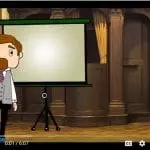[Originally published as Age of the Earth and the Bible part 2]
Most students who have graduated from Christian colleges can name at least four different views of the Genesis Creation account:
- the literal/historical “young earth” view
- the Day-age view,
- Progressive Creation
- and the Gap Theory.
Unfortunately, many of these same students would also likely say “we don’t really know because we weren’t there” and/or “it doesn’t really matter what you believe.”
Sadly, this couldn’t be further from the truth. First, as we will see below, we can reliably know when God created because He’s clearly told us in His Word. Second, it really does matter what we believe.
How we regard God’s Word (authoritatively or only as a guide book) has a direct bearing on how we live our lives. Today’s students want to know:
If truth doesn’t start on the first page, then how many pages do I need to turn in the Bible until I run into truth?
If truth doesn’t start on the first page, the rest is up for grabs.
Honest readers will admit that the text clearly means what it says in Genesis 1: God created in six normal days. Readers who spend time investigating the genealogies listed in Genesis 5, 10, and 11 will also admit that it’s a historical narrative with real people, real dates, and real lifespans that lead directly back to Adam, the first human who was miraculously created out of the dust by God.
They will also notice that there’s certainly no way to insert millions of years between these genealogies. While scholars may quibble about hundreds of years, and the ancient texts upon which our modern bibles are based may differ by a couple thousand years, honest readers will admit there’s certainly not room for millions of years.
Without filtering what’s clearly written in Genesis through secular science textbooks, the reader is left with a young earth.
If one submits to the authority of Scripture, relying on Scripture to tell them about the basic framework of the history of the world, origins, and their purpose, their lives will radiate outward from these understandings. Their entire worldview will be different than one who does not believe.
For example, to a Christian who holds that Genesis 1 is literal history:
- God is the all-powerful Creator who spoke Creation into existence (Psalm 33:9, Hebrews 11). Each person will give an account to this all-powerful Creator.
- God started out everything “very good” without bloodshed and disease, but man’s sins brought death, corruption, bloodshed and disease. Cancer is man’s fault, not God’s.
- God did not use a slow, random, murderous process of natural selection and survival of the fittest to bring the many types of life on earth into existence.
- The fossil record reflects God’s judgement on a world turned corrupt after the Fall.
- Racism has no foundation because there aren’t millions of years for the human line to splinter off to various “races.” A recent dispersion at the Tower of Babel means all people groups are closely related, separated by only hundreds of generations.
Submitting to biblical truth—beginning in Genesis—results in all these benefits and more. A person whose worldview is anchored to biblical foundations will also be constantly reminded that they are in the world but not of the world, and that the world has fallen into the deception of the enemy (1 John 5:19). They will see the lie of “deep time” espoused in the vast majority of secular schools, media outlets, and state parks. These two perspectives are very different: It’s either death and suffering over millions of years before Adam or a perfect creation marred by original sin just thousands of years ago.
A person can be saved by the Blood of Jesus and still believe in deep time, so we’re not talking one’s salvation. But if they believe in long ages they can’t grow fully in their faith because it undermines the authority of Scripture and erases the logical foundation for Christ on the cross. Just try to explain the Gospel to someone without referring to a historical view of Genesis. It is a difficult (if not impossible) task.
Many Christians feel pressured to be accepted by the mainstream and thus buy into the idea of millions of years. Some just haven’t fully thought through why they believe the way they do. Most of the time they really don’t know how much it’s costing them and their families.
Because I “converted” to a Biblical Creationist late in life, my two older children were raised by Christian parents who had “undeclared” positions on origins. Their questions about the dinosaurs and cavemen were always prefaced with “if the earth is young, the answer is… but if the earth is old, the answer is…”
With this type of conditional answer to many of life’s very basic questions, what they were really hearing was “maybe dad doesn’t know,” or (even worse) “maybe the Bible, which is supposed to be the most definitive book for me to build my life upon, doesn’t have an answer, or perhaps it even doesn’t even have the correct answer.” Fortunately, I had the opportunity to re-solidify their faith before they went to college.
Blessings will come to those who completely embrace the whole Scripture. For example, Jesus said, “For whoever is ashamed of Me and My words, of him the Son of Man will be ashamed when He comes in His own glory, and in His Father’s, and of the holy angels” (Luke 9:26).
The Book of Psalms is likely one of the most frequently read books of the Bible. The very beginning of this book starts out by stating those who believe in and meditate on the Torah (the first five books of Bible, led by Genesis) will be blessed in every way:
Blessed is the man who walks not in the counsel of the ungodly, nor stands in the path of sinners, nor sits in the seat of the scornful; But his delight is in the law [Torah] of the Lord, and in His law he meditates day and night. He shall be like a tree planted by the rivers of water, that brings forth its fruit in its season, whose leaf also shall not wither; and whatever he does shall prosper. (Psalms 1:1–3).
The Bible presents the unchangeable, perfect, and true Words of God Himself, including what God says about the history of our world—history that occurred before the Great Flood of Noah’s time thousands of years ago. And, since the Bible says that God cannot lie and that He even honors His Word along with His own name, we ought to treat Scripture with the reverence it deserves.
See 2 Peter 1:31; 2 Timothy 3:16; Numbers 23:19; Titus 1:2; Matthew 24:35; Psalm 12:6–7; Proverbs 30:5; and Psalm 138:2.







